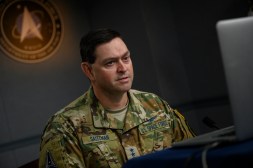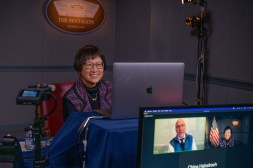Pentagon’s ‘force of the future’ and America’s disconnected millennials

Secretary of Defense Ash Carter spoke July 11 at the 80th Annual Conference of the National Association of Counties in Charlotte, North Carolina. (Department of Defense)
The Pentagon faces one of the toughest talent management challenges in its history: how to build the high-tech force of the future with a generation of millennials who are increasingly disconnected from a sense of service.
“Because fewer Americans are serving in uniform, fewer have personal connections to those who do,” Secretary of Defense Ash Carter said July 11 during a keynote speech at the 80th Annual Conference of the National Association of Counties in Charlotte, North Carolina. “For my generation and my parents’ generation, three out of four had a family member who served. But for our kids’ generation, it’s only one in three.”
That trend is likely to continue, and the connections Carter referred to may grow weaker still. But the Defense Department has no choice but to pursue millennials to become the nation’s future leaders and defenders — an inheritance paid for in blood and sacrifice. And while many will undoubtedly answer the nation’s call, this new generation poses significant challenges for the Pentagon’s Force of the Future initiative.
“For us to keep recruiting and retaining the best America has to offer, the military has to be an attractive place to work, especially for those with in-demand talent and high-level skills,” Carter said. “Some young Americans today aren’t satisfied with industrial-age career tracks. They want to be on a jungle gym, where you get up by moving around and having new experiences, not an escalator where you get on and wait your turn.”
To build what Carter calls the force of the future, the Pentagon is pushing hard to become a more attractive place to work. According to Carter, that involves becoming more geographically diverse and providing on-ramps and off-ramps to provide employees more career options. It also involves “bringing our personnel management systems into the 21st century,” he said.
“We’re also drilling tunnels through the walls that too often separate government and the private sector, particularly in scientific and commercial technology areas,” Carter said, referring to the Pentagon’s recent formation of an experimental innovation unit based in Silicon Valley, a new military branch of the U.S. Digital Service, investments for tech startups and a revamped industry fellowship program for military officers.
Carter said renewing the close ties between industry and the Defense Department is critical to ensuring the military’s technological superiority. “Our technological edge has never been guaranteed. It’s not a birthright,” Carter said. To sustain America’s technology edge, the Pentagon must keep up with the globalization of commercial technologies that are now in the hands of potential adversaries, he said.
“To stay ahead of these challenges, DOD is investing in innovation. We’re pushing the envelope in new technologies like cyber, autonomous systems and hypersonic engines that can fly over five times the speed of sound,” Carter said.
But Carter acknowledged that America’s relationship with its military is undergoing fundamental changes that will make it more difficult than ever for the military to recruit and retain the high-tech workforce it will need. “One of our nation’s founding precepts was the citizen soldier, based on the idea that in wartime every American would be expected to do their part,” he said. “And for much of our history, that’s what happened. That’s no longer the case anymore.”
The new realities facing the Defense Department may mean that while some choose to serve 20 or more years, others may move back and forth between national service and private sector opportunities, according to Carter. “We know we can’t push a one-size fits all career model anymore.”






